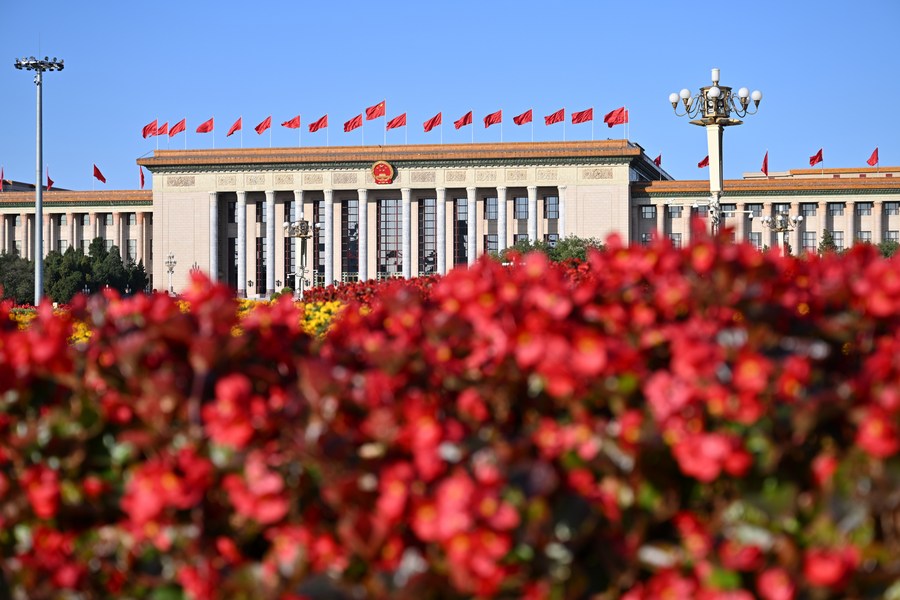Institutional reform draft plan unveiled


Plan: National data bureau to be set up
China has unveiled a draft plan for the biggest reorganization of State Council departments in five years as part of its broader efforts to bolster self-reliance in science and technology, enhance financial oversight and protect intellectual property rights.
The draft plan on the institutional reform of the State Council, China's Cabinet, includes steps to restructure the Ministry of Science and Technology and the Ministry of Agriculture and Rural Affairs, and set up a national administration for financial regulation — a financial oversight body.
A new regulator for data governance will be created to coordinate the integration, sharing, development and application of data resources, the plan said.
The proposed national data bureau, to be administered by the National Development and Reform Commission, will be responsible for advancing the development of data-related fundamental institutions and pushing forward the planning and building of a Digital China, the digital economy and the digital society.
The draft plan for the Cabinet reshuffle comes five years after an institutional reform of the State Council cut the number of ministerial-level bodies by eight and vice-ministerial-level entities by seven.
Xiao Jie, state councilor and secretary-general of the State Council, introduced the draft plan at the second plenary meeting of the first session of the 14th National People's Congress on Tuesday.
The plan, adopted at the second plenary session of the 20th Communist Party of China Central Committee last week, has been submitted to the NPC deputies for deliberation.
Xiao explained that the CPC Central Committee will set up a central commission on science and technology to enhance the Party's leadership in the sector, and the restructured Ministry of Science and Technology will serve as the working body of the new commission.
The restructured ministry will play a bigger role in building a new system for mobilizing the nation to make technological breakthroughs, optimizing sci-tech innovation, facilitating application of sci-tech advances, and coordinating science and technology with economic and social development, according to the draft plan.
The Ministry of Science and Technology's task of bringing in talent from overseas will be reassigned to the Ministry of Human Resources and Social Security, which will also adopt the functions of the State Administration of Foreign Expert Affairs.
The setting up of a national administration for financial regulation is intended to solve some long-standing, prominent problems and issues in the financial sector, Xiao said.
The new body, which will replace the China Banking and Insurance Regulatory Commission, will be responsible for supervising financial institutions outside the securities sector, step up oversight of institutions, actions and functions, coordinate the protection of consumer rights in the financial sector and investigate wrongdoings.
The draft plan has further called for the establishment of a local financial regulatory mechanism, with agencies dispatched by central financial regulators as the mainstay to tackle problems such as a lack of means for oversight and professional talent shortage in local financial regulatory departments.
The reform also involves the adjustment of the China Securities Regulatory Commission from a public institution to a government agency directly under the State Council, and the reform of the local branches of the People's Bank of China, the country's central bank, will be deepened.
In order to upgrade IPR creation, application, protection and management, the National Intellectual Property Administration — currently managed by the State Administration for Market Regulation — will become an institution that operates directly under the State Council, the plan said.
The functions of the Ministry of Agriculture and Rural Affairs will be optimized, and the ministry will take over the functions of the National Rural Revitalization Administration.
Meanwhile, the number of positions at central government departments will be cut by 5 percent as part of the reshuffle, and the State Council will still consist of 26 departments, besides its general office, after the draft plan is implemented.
- Tongji University's Wu Jiang assumes presidency of architects' Asia council
- PLA carries out drone training operations near Dongsha Islands
- PLA monitors US naval vessels transiting the Taiwan Strait
- Losar warmth in a new home
- New carrier rocket built by Beijing company fails in maiden flight
- Toxic gas leak in Anhui classified as major work safety liability accident




































